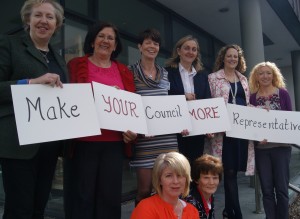The 5050 Group welcomes the overall increase in the number of women candidates contesting this Friday’s local elections. However, there is plenty room for improvement if parties are to meet their gender quota obligations at the next general election.
This election sees a total of 2040 candidates contesting council seats across the country, 1599 (78.4%) men and 441 (21.6%) women. While the number of women candidates is much less than that of men, there are, in fact, more women contesting these elections in comparison to five years ago when 314 (17.2%) of the total number of candidates were women.
“One of the main reasons to account for the increase in women candidates is the Electoral (Amendment) (Political Funding) Act, 2012. This Act specifies that at the next Dáil election, at least 30% of party candidates must be women. If not, parties will lose 50% of the funding they receive from the State to run their operations. While the law is not applicable at local elections, many of the political parties have sensibly used these elections to recruit and run women candidates. This indicates that the gender quota legislation is already having a positive effect on female candidacy in Ireland but some parties need to do a lot more if they are to meet their obligations under this Act” said Noirín Clancy, National Chairperson of the 5050 Group.
In this election, left and centre-left parties are running the highest proportion of women candidates and the majority of women candidates are based in urban constituencies. People Before Profit, the Anti-Austerity Alliance, Sinn Féin and the Green Party have all selected over 30% women candidates to contest these elections. The Labour Party’s candidates consist of 29.1% women. However, neither Fine Gael nor Fianna Fáil have reached their own gender targets for these elections. Fine Gael has 22.8% women candidates while Fianna Fáil has only 17.1% women candidates. This is despite the fact that female membership within those parties is quite high at 41% and 34% respectively.
Such lack of progress could cost these parties in the next general election when gender quota legislation will be implemented for the first time. This means that parties who don’t select 30% women candidates will lose half of their State funding. According to research by Fiona Buckley, lecturer in gender politics in UCC, Fine Gael and Fianna Fáil could lose in the region of between €700,000 and €1,000,000 on an annual basis in terms of State funding is they fail to meet the gender quota at the next general election.
The overall increase in the number of women candidates in these elections will likely see an increase in the number of women councillors elected. In Irish elections it is the case that when more women appear on the ballot paper, then more women get elected. This may prove significant for the election of more women to Dáil Éireann in future years as becoming a councillor is considered a stepping stone for politicians seeking a seat in Dáil Éireann. Research shows that this is particularly true in the case of women. “An increase in the number of women in our local councils and in Dáil Éireann will make inroads into bringing about a more representative democracy in Ireland” said Noirín Clancy.
http://www.irishtimes.com/news/politics/fine-gael-and-fianna-f%C3%A1il-have-lowest-percentage-of-female-local-election-candidates-1.1797553#.U3qUnle2RP8.email


